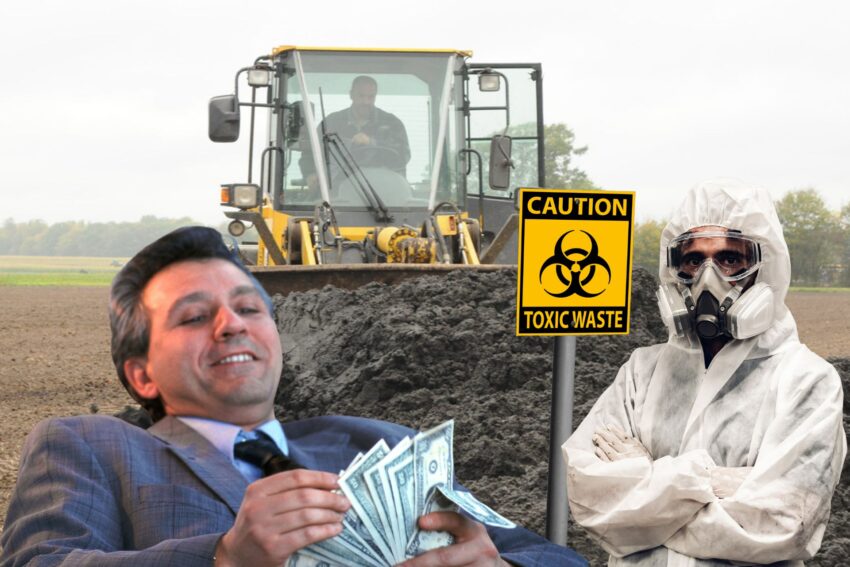Companies that market themselves as “green” are often using this term as a marketing scheme to sell us poison, in this case quite literally. The New York Times recently unveiled a troubling narrative where a company, Synagro, under the shadow of financial giants like Goldman Sachs, is attempting to shield itself from the repercussions of its dealings in sewage sludge fertilizer. This fertilizer, deceptively marketed as a sustainable solution, is now known to harbor “forever chemicals” or PFAS, which pose significant health risks to both the land and its stewards.
The Contamination Crisis
Synagro has been in the business of transforming sewage sludge into what it calls ‘biosolids’—a product touted for its agricultural benefits. However, as revealed by Hiroko Tabuchi of The New York Times, this sludge often contains PFAS, chemicals linked to severe health issues like cancer and birth defects. The article states, “For decades, a little-known company now owned by a Goldman Sachs fund has been making millions of dollars from the unlikely dredges of American life: sewage sludge.” This revelation not only exposes the environmental hypocrisy but also the health risks farmers unknowingly accept when they use this fertilizer on their lands.
We have covered this story before.
Farmers Fight Back
Farmers across the nation, especially those in Texas where PFAS contamination has been legally challenged, are finding themselves at the frontline of an environmental and legal battle. Their lands, their livelihoods, and their health are on the line. The ranchers in Johnson County, Texas, for instance, have faced dire consequences, with their soil and water testing positive for PFAS, leading to lawsuits against Synagro. This situation underscores a broader issue where the agricultural backbone of America is left vulnerable to corporate interests that prioritize profit over safety.
Industry’s Response: Lobbying for Immunity
Rather than addressing the contamination, Synagro, alongside the wastewater treatment plants that supply the sludge, has turned to Congress, seeking legislative protection from lawsuits. The lobbying push, as noted by Tabuchi, “would protect sludge companies like Synagro, as well as the wastewater plants that provide the sludge, from lawsuits.” This move has been met with criticism from environmental advocates and legal experts who argue that such protection circumvents the accountability that should be fundamental in environmental stewardship. There is also a question of accountability regarding the EPA, which encouraged farmers to use the sludge as a sustainable and inexpensive solution.
The Broader Implications
This scenario isn’t just about one company or one type of fertilizer; it’s about the integrity of our agricultural practices. Farmers, who are often portrayed as the caretakers of our land, are being pushed into a corner where their right to safe, uncontaminated land is being bartered away for economic gains by distant corporations. Laura Dumais, an attorney with Public Employees for Environmental Responsibility, told the New York Times, “It seems crazy to be able to say they’re a passive receiver and they shouldn’t be liable, that they know it’s harmful but they’re going to continue to sell it.”
A Call to Action
The farming community needs more than just acknowledgment; they require robust legal and environmental protections against such practices. Farmers are not just passive recipients of whatever the market offers; they are active stewards of the land, deserving of transparency, safety, and the right to litigate when their health and livelihoods are compromised. The narrative around biosolids must change from a green marketing ploy to an honest discussion about sustainability, safety, and responsibility.
This story is not just an expose but a call to action for all stakeholders in agriculture to demand accountability, better regulation, and support for those who till the earth. The health of our food, our environment, and ultimately our communities depends on actions taken today.


